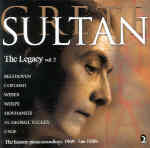From the heavy-handed, invariant version of Beethoven’s Diabelli Variations coupled with some non-dancelike Bagatelles, it is clear that Grete Sultan not only lacks idiomatic understanding of her repertoire but also has little capacity for subtlety in tone or dynamics. Each variation in Beethoven’s famous set ought to outline its own little sound world–this was Schnabel’s gift in this work. These pieces are theoretically complex, so it would stand to reason that an interpreter of 20th-century repertoire would well understand them; but listening to her play either the Beethoven or the more modern goods in a less-than-convincing fashion, you have to wonder just what her ideal material is.
Aaron Copland’s wonderful (but under-performed) Piano Sonata is the greatest casualty. In comparison with Leo Smit’s elegant and robust reading, this dull, thunky rendition seems too clipped, much too tempo-enslaved. In the first movement, the “jazzy” second theme feels mannered, with no trace of ebb or flow, making the work appear both forced and lazy. Grace notes, not ignorable details in the final movement, are given too much emphasis–each note seems as audible and in the foreground as any other. Sultan has a decent ear for sonority and voicing but little sense of motion, so this set of “note-by-note” performances doesn’t add up to much, no matter how often she stumbles on a lovely chord.
When playing “new” music, it is important that pieces be treated as complete musical experiences, with phrasing and direction taken as seriously as note accuracy–it ought to sound as “effortless” as a good performance of more standard repertoire. Unfortunately, Sultan’s performances are only halfway there. For instance, Ben Weber’s Episodes undoubtedly is a more interesting piece than Sultan describes. In parts I and II her lack of focus and inability to create musical “cliffhangers” makes caesura pauses sound like endings. And again, she punches and pokes her way through this dense piece, playing with a fierce, unmusical quality.
Her reading of Hovhaness’ Yenovk (The Troubador), a piece rooted in non-western musical traditions, is too severe (and her piano tone here is no different from the way she chooses to play Wolpe or Cage, if in fact it is a choice). Tui St. George Tucker’s Tantum Ergo is a little-known piece that never seems to go anywhere–though who can say if it is the composer’s fault or not, so dull is Sultan’s reading. Only in John Cage’s Etudes Australes, pieces that are about sonority rather than overall design, does her raw, foolishly consistent tone pay off. Old, pinched sonics don’t help, but these pieces don’t suffer because of the engineering. Although it’s nice to see some of this repertoire released on disc, the music’s cause isn’t really served when it’s played with such lack of fire and imagination.
































